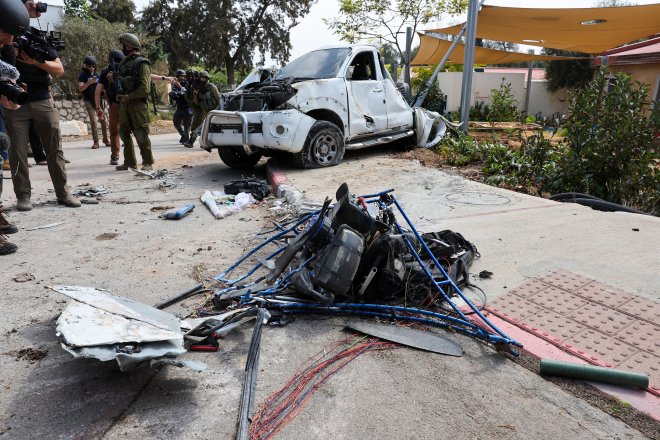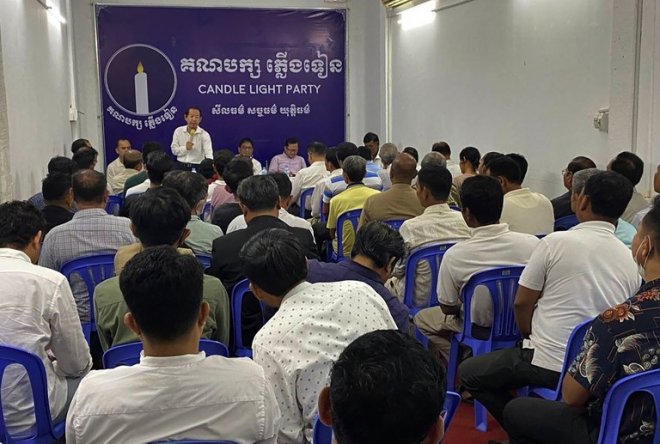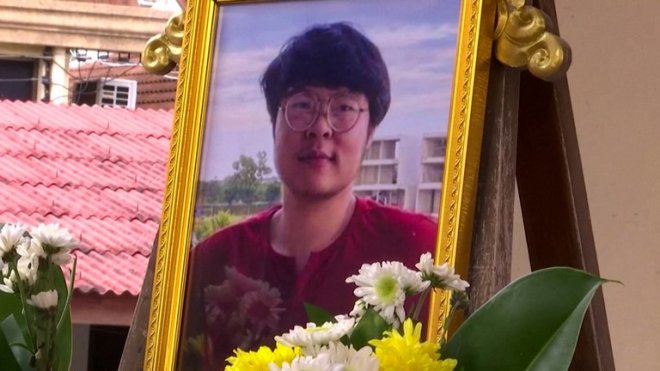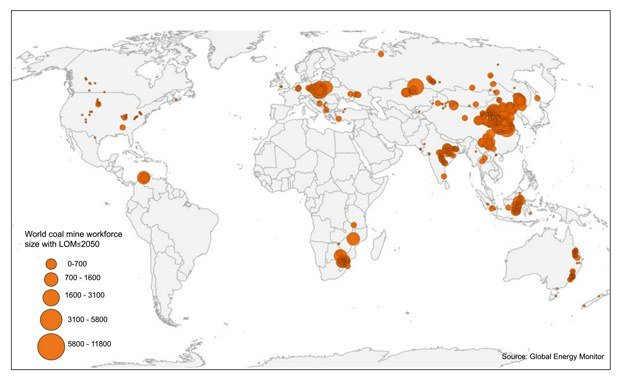China gives up reporting COVID-19 figures as virus rips through population
China"s National Health Commission has announced it will no longer be publishing daily COVID-19 infection figures, as the virus rips through the population with the abandonment of rolling lockdowns, mass tracking of citizens and compulsory testing.
"As of today, we will no longer be releasing daily statistics on the pandemic, with any data released by the China Centers for Disease Control and Prevent for the purposes of reference and research," the health ministry said on its official website.
The announcement came as China said Monday that beginning on Jan. 8, 2023 it will put an end to a mandatory quarantine on arrival for overseas travelers that had been in place since March 2020.
It also followed a leaked ministerial document dated Dec. 20 -- which analysts said was likely the result of computer modeling in the absence of widespread testing -- said around 250 million people may now be infected with COVID-19 following the lifting of control measures.
Officials had already warned that the development of the current outbreak had become "impossible to track" in the absence of mass testing.
High-profile pro-government commentator Hu Xijin, the former editor-in-chief of the Global Times, said the figures released in recent days had been "seriously distorted," and believed by no-one.
The announcement came amid anecdotal evidence of skyrocketing death rates and overwhelming pressure on hospitals. A hospital in Taizhou city recently announced it had passed two million emergency room visits in recent days, while a video clip uploaded to social media by a Shanghai resident on Sunday showed hundreds of people lining up to get served at the city"s Baoxing Funeral Parlor in Shanghai, with the line stretching out of the gate and onto the street.
"This is what it"s like trying to take a number," a person is heard saying on the audio. "You need to come early on Monday to get in line."
An official in China"s political and legal committee system, the ruling Chinese Communist Party"s law enforcement hierarchy, said the massive pressure on crematoriums in the city had prompted municipal civil affairs bureau officials to take control of the sector.
Nobody is now allowed to transport the remains of their dead relatives to funeral homes, but must wait for them to be picked up by funeral home staff, the official told RFA on condition of anonymity.
The official said the current wave of infections is driven by government pressure to reboot the economy after months of damage under Communist Party leader Xi Jinping"s zero-COVID policy, and suggests the government is pursuing "herd immunity."
"They are expressly telling people who have tested positive to go to work, to spread the infection as fast as possible," the official said. "It"s like this all over the country now."
Employees who answered the phone at several Beijing funeral homes on Dec. 26 confirmed that the restrictions on the transportation of human remains are currently being enforced, amid a ban on hearses lining up outside crematoriums.
Herd immunity with the Omicron variant of COVID-19 has been described as unlikely by immunology professor Danny Altmann, who described Omicron in a July 1 article in The Guardian as "a kind of stealth virus that gets in under the radar without doing too much to alert immune defenses."
"Even having had Omicron, we’re not well protected from further infections," Altmann wrote.
Xia Ming, a professor of political science at New York"s City University of New York, said hospitals and healthcare are themselves seen as a key driver of economic growth.
"Everything is for profit, and everything is seen as a contribution to GDP and to the economy," Xia said. "The Chinese leadership believes that herd immunity will get China out of the pandemic and rescue the economy, but I"m afraid that"s ... an illusion."
"This kind of blind optimism is reflective of the current state of Chinese politics, which is the blind leading the blind," he said.
![]() Masked commuters walk through a walkway in between two subway stations as they head to work during the morning rush hour in Beijing, Dec. 20, 2022. Credit: AP Photo"It"s like a deluge"
Masked commuters walk through a walkway in between two subway stations as they head to work during the morning rush hour in Beijing, Dec. 20, 2022. Credit: AP Photo"It"s like a deluge"
In the absence of data, local governments are issuing estimates of case numbers based on computer modeling, with the eastern city of Qingdao reporting an estimated 500,000 new infections daily in the city.
A Qingdao resident who gave only the nickname John said that was likely an underestimate.
"I think it"s far more than 500,000 ... it"s moving so fast, it"s like a deluge," he said. "I never expected it to spread so fast."
"There"s a hospital near where I live, with vehicles lined up on the street outside ... bringing people for treatment," he said. "Our whole family is infected."
Meanwhile, authorities in the eastern province of Zhejiang estimated there were more than one million new infections across the province daily, with similar shortages of mortuary spaces and cremation slots at funeral homes.
Officials announced on Dec. 25 that new cases are likely to hit two million a day at the peak, which they expect will be around Jan. 1.
Medical professionals told Radio Free Asia last week that many of those being treated in hospital have areas of "ground glass opacity" on their lung scans, which was widely seen during the early days of the pandemic when people were made sick by the original strain of COVID-19, prompting speculation that the Omicron variant and the original strain are now mixing in the general population.
![]() A couple wearing protective masks kiss at a fever clinic of a hospital, as COVID-19 outbreaks continue in Shanghai, China, Dec. 23, 2022. Credit: ReutersLimited antivirals for elite
A couple wearing protective masks kiss at a fever clinic of a hospital, as COVID-19 outbreaks continue in Shanghai, China, Dec. 23, 2022. Credit: ReutersLimited antivirals for elite
Former Chinese Red Cross executive Ren Ruihong said there is a limited amount of paxlovid being imported, although the government has consistently refused U.S. help with the current outbreak.
"What this means is that a lot of retired, high-ranking officials have been dying in Beijing ... so they are promising to send out [antivirals]," Ren said. "But nobody has gotten any yet."
Ren said it was unclear whether there would be enough supply to treat anyone outside of the Communist Party elite, however.
An official who answered the phone at the Beijing Municipal Health Commission declined to comment on last week"s leaked document when contacted by Radio Free Asia on Monday.
"Why did you call us? You said we didn"t issue that document ... you should try somewhere else," the official said.
An official who answered the phone at the National Health Commission also declined to comment.
"We"re not sure what you mean ... I don"t know exactly what you"re talking about," the official said.
The news website Caixin reported on Dec. 24 that medical personnel are being sent to Beijing to support local colleagues amid the current outbreak in treating critically ill patients.
However, it cited a doctor as saying it wouldn"t help to transfer medical staff across the country when the outbreak is just as serious elsewhere in China.
Translated by Luisetta Mudie.
[圖擷取自網路,如有疑問請私訊]
"As of today, we will no longer be releasing daily statistics on the pandemic, with any data released by the China Centers for Disease Control and Prevent for the purposes of reference and research," the health ministry said on its official website.
The announcement came as China said Monday that beginning on Jan. 8, 2023 it will put an end to a mandatory quarantine on arrival for overseas travelers that had been in place since March 2020.
It also followed a leaked ministerial document dated Dec. 20 -- which analysts said was likely the result of computer modeling in the absence of widespread testing -- said around 250 million people may now be infected with COVID-19 following the lifting of control measures.
Officials had already warned that the development of the current outbreak had become "impossible to track" in the absence of mass testing.
High-profile pro-government commentator Hu Xijin, the former editor-in-chief of the Global Times, said the figures released in recent days had been "seriously distorted," and believed by no-one.
The announcement came amid anecdotal evidence of skyrocketing death rates and overwhelming pressure on hospitals. A hospital in Taizhou city recently announced it had passed two million emergency room visits in recent days, while a video clip uploaded to social media by a Shanghai resident on Sunday showed hundreds of people lining up to get served at the city"s Baoxing Funeral Parlor in Shanghai, with the line stretching out of the gate and onto the street.
"This is what it"s like trying to take a number," a person is heard saying on the audio. "You need to come early on Monday to get in line."
An official in China"s political and legal committee system, the ruling Chinese Communist Party"s law enforcement hierarchy, said the massive pressure on crematoriums in the city had prompted municipal civil affairs bureau officials to take control of the sector.
Nobody is now allowed to transport the remains of their dead relatives to funeral homes, but must wait for them to be picked up by funeral home staff, the official told RFA on condition of anonymity.
The official said the current wave of infections is driven by government pressure to reboot the economy after months of damage under Communist Party leader Xi Jinping"s zero-COVID policy, and suggests the government is pursuing "herd immunity."
"They are expressly telling people who have tested positive to go to work, to spread the infection as fast as possible," the official said. "It"s like this all over the country now."
Employees who answered the phone at several Beijing funeral homes on Dec. 26 confirmed that the restrictions on the transportation of human remains are currently being enforced, amid a ban on hearses lining up outside crematoriums.
Herd immunity with the Omicron variant of COVID-19 has been described as unlikely by immunology professor Danny Altmann, who described Omicron in a July 1 article in The Guardian as "a kind of stealth virus that gets in under the radar without doing too much to alert immune defenses."
"Even having had Omicron, we’re not well protected from further infections," Altmann wrote.
Xia Ming, a professor of political science at New York"s City University of New York, said hospitals and healthcare are themselves seen as a key driver of economic growth.
"Everything is for profit, and everything is seen as a contribution to GDP and to the economy," Xia said. "The Chinese leadership believes that herd immunity will get China out of the pandemic and rescue the economy, but I"m afraid that"s ... an illusion."
"This kind of blind optimism is reflective of the current state of Chinese politics, which is the blind leading the blind," he said.
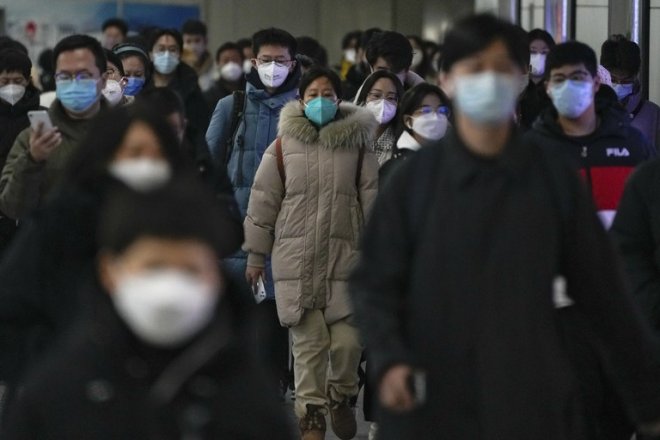 Masked commuters walk through a walkway in between two subway stations as they head to work during the morning rush hour in Beijing, Dec. 20, 2022. Credit: AP Photo"It"s like a deluge"
Masked commuters walk through a walkway in between two subway stations as they head to work during the morning rush hour in Beijing, Dec. 20, 2022. Credit: AP Photo"It"s like a deluge"In the absence of data, local governments are issuing estimates of case numbers based on computer modeling, with the eastern city of Qingdao reporting an estimated 500,000 new infections daily in the city.
A Qingdao resident who gave only the nickname John said that was likely an underestimate.
"I think it"s far more than 500,000 ... it"s moving so fast, it"s like a deluge," he said. "I never expected it to spread so fast."
"There"s a hospital near where I live, with vehicles lined up on the street outside ... bringing people for treatment," he said. "Our whole family is infected."
Meanwhile, authorities in the eastern province of Zhejiang estimated there were more than one million new infections across the province daily, with similar shortages of mortuary spaces and cremation slots at funeral homes.
Officials announced on Dec. 25 that new cases are likely to hit two million a day at the peak, which they expect will be around Jan. 1.
Medical professionals told Radio Free Asia last week that many of those being treated in hospital have areas of "ground glass opacity" on their lung scans, which was widely seen during the early days of the pandemic when people were made sick by the original strain of COVID-19, prompting speculation that the Omicron variant and the original strain are now mixing in the general population.
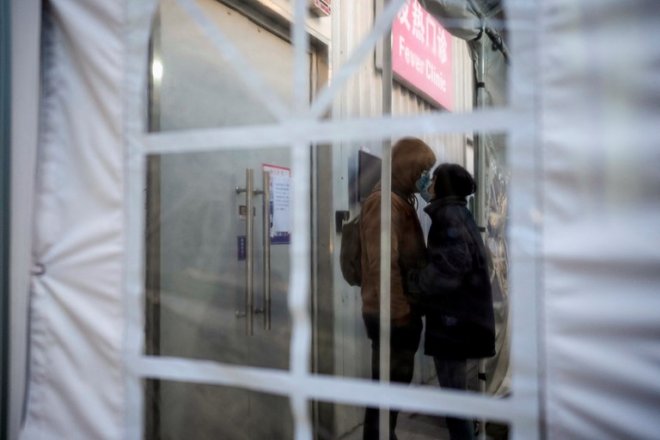 A couple wearing protective masks kiss at a fever clinic of a hospital, as COVID-19 outbreaks continue in Shanghai, China, Dec. 23, 2022. Credit: ReutersLimited antivirals for elite
A couple wearing protective masks kiss at a fever clinic of a hospital, as COVID-19 outbreaks continue in Shanghai, China, Dec. 23, 2022. Credit: ReutersLimited antivirals for eliteFormer Chinese Red Cross executive Ren Ruihong said there is a limited amount of paxlovid being imported, although the government has consistently refused U.S. help with the current outbreak.
"What this means is that a lot of retired, high-ranking officials have been dying in Beijing ... so they are promising to send out [antivirals]," Ren said. "But nobody has gotten any yet."
Ren said it was unclear whether there would be enough supply to treat anyone outside of the Communist Party elite, however.
An official who answered the phone at the Beijing Municipal Health Commission declined to comment on last week"s leaked document when contacted by Radio Free Asia on Monday.
"Why did you call us? You said we didn"t issue that document ... you should try somewhere else," the official said.
An official who answered the phone at the National Health Commission also declined to comment.
"We"re not sure what you mean ... I don"t know exactly what you"re talking about," the official said.
The news website Caixin reported on Dec. 24 that medical personnel are being sent to Beijing to support local colleagues amid the current outbreak in treating critically ill patients.
However, it cited a doctor as saying it wouldn"t help to transfer medical staff across the country when the outbreak is just as serious elsewhere in China.
Translated by Luisetta Mudie.
[圖擷取自網路,如有疑問請私訊]
|
本篇 |
不想錯過? 請追蹤FB專頁! |
| 喜歡這篇嗎?快分享吧! |
相關文章
AsianNewsCast








